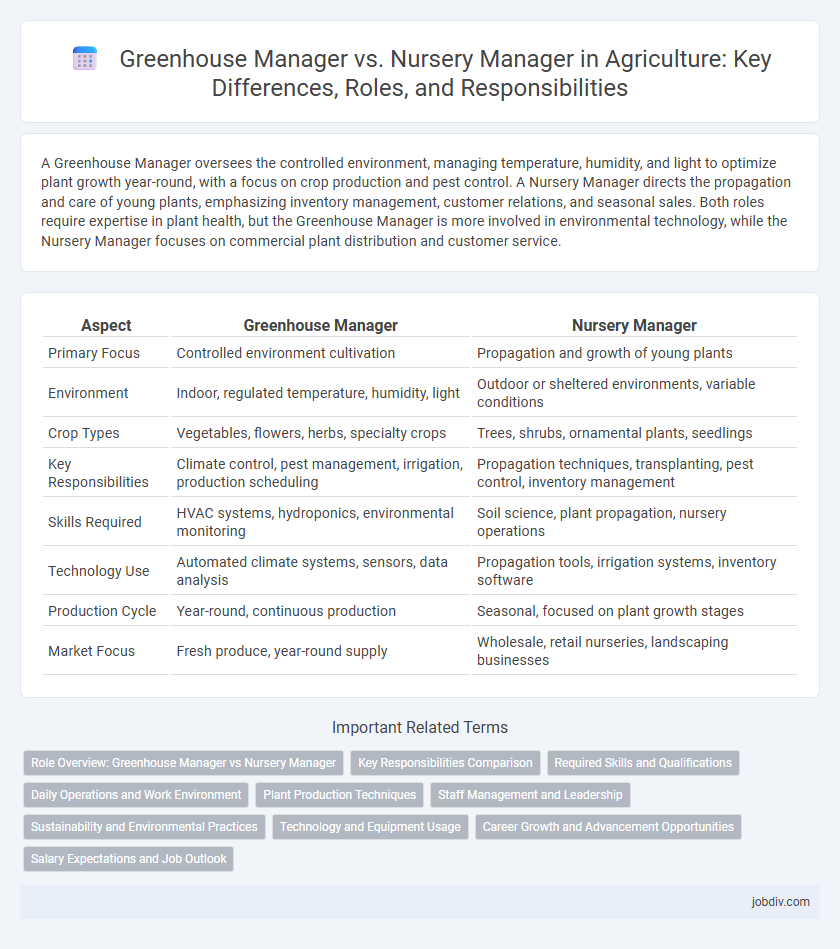A Greenhouse Manager oversees the controlled environment, managing temperature, humidity, and light to optimize plant growth year-round, with a focus on crop production and pest control. A Nursery Manager directs the propagation and care of young plants, emphasizing inventory management, customer relations, and seasonal sales. Both roles require expertise in plant health, but the Greenhouse Manager is more involved in environmental technology, while the Nursery Manager focuses on commercial plant distribution and customer service.
Table of Comparison
| Aspect | Greenhouse Manager | Nursery Manager |
|---|---|---|
| Primary Focus | Controlled environment cultivation | Propagation and growth of young plants |
| Environment | Indoor, regulated temperature, humidity, light | Outdoor or sheltered environments, variable conditions |
| Crop Types | Vegetables, flowers, herbs, specialty crops | Trees, shrubs, ornamental plants, seedlings |
| Key Responsibilities | Climate control, pest management, irrigation, production scheduling | Propagation techniques, transplanting, pest control, inventory management |
| Skills Required | HVAC systems, hydroponics, environmental monitoring | Soil science, plant propagation, nursery operations |
| Technology Use | Automated climate systems, sensors, data analysis | Propagation tools, irrigation systems, inventory software |
| Production Cycle | Year-round, continuous production | Seasonal, focused on plant growth stages |
| Market Focus | Fresh produce, year-round supply | Wholesale, retail nurseries, landscaping businesses |
Role Overview: Greenhouse Manager vs Nursery Manager
Greenhouse Managers oversee controlled environment agriculture, focusing on optimizing temperature, humidity, and light to maximize crop yield and quality in enclosed structures. Nursery Managers specialize in the propagation and early growth stages of plants, managing outdoor or protected nurseries to ensure healthy seedling development and plant readiness for transplantation. Both roles require expertise in plant science, resource management, and pest control but differ in environmental settings and production stages.
Key Responsibilities Comparison
Greenhouse managers oversee the controlled environment for plant growth, managing temperature, humidity, and light to optimize crop production while ensuring pest and disease control. Nursery managers coordinate the propagation and care of young plants, focusing on soil preparation, irrigation, and plant health to support successful transplanting. Both roles require expertise in horticulture, but greenhouse managers emphasize environmental regulation whereas nursery managers prioritize plant propagation and early-stage growth management.
Required Skills and Qualifications
Greenhouse managers require expertise in climate control systems, pest management, and crop scheduling, often holding degrees in horticulture or agricultural science. Nursery managers need strong knowledge of plant propagation, soil science, and customer service, with qualifications in botany or agronomy being common. Both roles demand leadership skills, but greenhouse managers emphasize technical proficiency, while nursery managers prioritize inventory management and sales knowledge.
Daily Operations and Work Environment
Greenhouse Managers oversee climate control systems, crop scheduling, and pest management to optimize plant growth in controlled environments, while Nursery Managers focus on propagating and maintaining young plants, coordinating irrigation, and ensuring proper soil conditions. The daily operations of Greenhouse Managers involve monitoring automated systems and adjusting environmental parameters, whereas Nursery Managers often engage in hands-on plant care and inventory management. Both roles require leadership in supervising staff, but Greenhouse Managers typically operate in enclosed, technologically equipped facilities, and Nursery Managers work primarily in outdoor or semi-covered spaces with variable weather conditions.
Plant Production Techniques
Greenhouse Managers specialize in controlled environment agriculture, optimizing temperature, humidity, and light to enhance plant growth and extend growing seasons using advanced hydroponic or aeroponic systems. Nursery Managers focus on propagating plants through traditional methods such as cuttings, grafting, and seed germination, ensuring healthy stock production for transplanting. Both roles require expertise in pest management, soil health, and irrigation systems but differ in scale and technological integration.
Staff Management and Leadership
Greenhouse Managers oversee a diverse team responsible for climate control, plant care, and pest management, requiring strong leadership skills to coordinate daily operations and maintain productivity. Nursery Managers lead staff specializing in propagation, transplanting, and inventory management, emphasizing training and development to ensure high-quality plant production. Both roles demand effective communication, team motivation, and conflict resolution to optimize workforce performance in controlled agricultural environments.
Sustainability and Environmental Practices
Greenhouse Managers implement advanced climate control technologies to optimize energy efficiency and reduce water usage, promoting sustainable crop production. Nursery Managers prioritize organic pest management and soil health practices, enhancing biodiversity and minimizing chemical inputs in plant propagation. Both roles contribute to environmental stewardship by integrating eco-friendly methods tailored to controlled environments and plant growth phases.
Technology and Equipment Usage
Greenhouse Managers utilize advanced environmental control systems, climate sensors, and automated irrigation technology to optimize plant growth within enclosed structures. Nursery Managers predominantly employ specialized propagation tools, irrigation setups, and pest management equipment designed for outdoor plant cultivation and seedling development. Both roles integrate digital monitoring platforms but differ in the scale and type of technology aligned with controlled environment agriculture versus open-air plant production.
Career Growth and Advancement Opportunities
Greenhouse Managers typically oversee controlled environment crop production, offering career growth through specialization in high-tech horticulture and integration of automation systems. Nursery Managers focus on outdoor plant cultivation and sales, with advancement opportunities in landscape management and wholesale distribution networks. Both roles provide pathways into senior agricultural management, but Greenhouse Managers often experience faster career progression due to the increasing demand for sustainable, year-round crop production technologies.
Salary Expectations and Job Outlook
Greenhouse Managers typically earn between $45,000 and $70,000 annually, with job growth projected around 8% due to increasing demand for year-round crop production. Nursery Managers earn slightly less on average, ranging from $40,000 to $65,000, but benefit from stable opportunities as the landscaping and horticultural industries expand. Both roles require expertise in plant care, but Greenhouse Managers often oversee more technologically advanced environments, influencing salary potential and future career prospects.
Greenhouse Manager vs Nursery Manager Infographic

 jobdiv.com
jobdiv.com